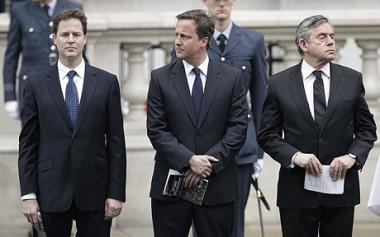350: UK structural reform – insights for property investors
11-14-2010
PropertyInvestin g.net www.google.co.uk
g.net www.google.co.uk
We thought we should describe our frank view on what the new Coalition policies will mean for the UK economy in the next four years and how this will impact property investment. We’ll also touch on the US situation and how the UK can learn from this.
Overspending crisis: Firstly and most importantly, years of overspending and public sector expansion by Labour has left the UK hugely indebted – each person in the country now owes £73,000 – this is the national debt, some £4.7 Trillion projected in a few years time. Basically, the tax revenues derived from the private sector could not pay for the public sector – and he nce the shortfall. To put this into perspective, referring to the extent of this insane overspending, the public sector has been allowed to grow from about 10% of GDP in 1910, to 30% by 1960 then up to 55% by 2009. Yes, this means the private sector at 45% is now smaller than the public sector at 55%. Little wander the UK has to borrow huge amounts of money to pay for this. Until the public sector shrinks to 45% or less of GDP, the country will continue to need to borrow huge amounts. So when you hear of 20% cuts in the public sector spending – that should be considered the absolute minimum required.
nce the shortfall. To put this into perspective, referring to the extent of this insane overspending, the public sector has been allowed to grow from about 10% of GDP in 1910, to 30% by 1960 then up to 55% by 2009. Yes, this means the private sector at 45% is now smaller than the public sector at 55%. Little wander the UK has to borrow huge amounts of money to pay for this. Until the public sector shrinks to 45% or less of GDP, the country will continue to need to borrow huge amounts. So when you hear of 20% cuts in the public sector spending – that should be considered the absolute minimum required.
Benefits: The interesting discussions on unemployed families in London getting housing benefit of £50,000 a year have been interesting – as if everyone has the right to live wherever they want to live. We wish we had a flat in Mayfair, but we cannot afford it. Why do decent hard working families need to shell out for such benefits – it’s ridiculous and wrong. The entitlement culture has got to an extreme as hard working people have been saddled with huge taxes to pay for a minority of people that have no intention of even trying to get a job.
Unemployed “On-Your-Bike”: The government will put a lot of pressure on some of the lazy minority of unemployed to “get on their bikes” and get a job – whatever job is available. The UK is abo ut the only country in the world that allows unemployed to say unemployed because they claim there is no suitable job for them – what we need is people to do any job, not just the job they like to do. A basic principle is to work for a living – not feed off hand-outs. People need to get into work, develop their skills and self esteem even if its loading shelves at a supermarket or washing dishes.
ut the only country in the world that allows unemployed to say unemployed because they claim there is no suitable job for them – what we need is people to do any job, not just the job they like to do. A basic principle is to work for a living – not feed off hand-outs. People need to get into work, develop their skills and self esteem even if its loading shelves at a supermarket or washing dishes.
Shift in Employment: As these people start to accept jobs that might be regarded as slightly lower than their station, this should drive down wage costs and increase competition for the lower paid jobs. Less foreign overseas migrants will be required to fill such positions and the local low paid work is likely to be taken up by local people. Meanwhile the government will make it more difficult for immigrants to get visas and they will need to prove they are skilled workers with qualifications. This might lead to a less rapidly expanding population, slightly less immigration, more indigenous local workers filling lower paid jobs as competition from immigrant workers reduces – we might get slightly lower service but the long term unemployed on benefits would reduce and these people’s skills – learnt at work – would increase. All good for the society at large – and creating a more empowered workforce.
Educated Public Sector Employees Now Available to Contribute: Many public sector workers will lose their jobs – many of these are highly skilled at public sector administrative work –  but they will probably struggle to get jobs in the private sector – as private sector managers will be reluctant and suspicious of taking on public sector employees that have no business skills and have a spending mind-set. The good news for the private sector is that most public sector employees are very well educated and can be re-trained – and these people can help boost productivity and growth in the UK. One would hope also that many of these people would start their own business – government help for such initiatives in the form of small loans and skills training would probably create a lot of value. For too many years, it was more attractive to go into the public sector because average wages in the public sector are actually higher than those in the private sector – yes, this is hard to believe but it is true – it’s also the same in the USA. That’s rather crazy – incentivizing the best people to join the spending public sector rather than the revenue generating private sector – this is one of the underlying structural reforms the current Coalition – or at least the Tories within the Coalition – want to change.
but they will probably struggle to get jobs in the private sector – as private sector managers will be reluctant and suspicious of taking on public sector employees that have no business skills and have a spending mind-set. The good news for the private sector is that most public sector employees are very well educated and can be re-trained – and these people can help boost productivity and growth in the UK. One would hope also that many of these people would start their own business – government help for such initiatives in the form of small loans and skills training would probably create a lot of value. For too many years, it was more attractive to go into the public sector because average wages in the public sector are actually higher than those in the private sector – yes, this is hard to believe but it is true – it’s also the same in the USA. That’s rather crazy – incentivizing the best people to join the spending public sector rather than the revenue generating private sector – this is one of the underlying structural reforms the current Coalition – or at least the Tories within the Coalition – want to change.
So expect to see the following happen:
· Reduced size of public sector
· Freeze on wages in public sector
· Redundancy in the public sector
· Higher taxes for all employees in the short term
· Reduced benefits for unemployed
· Reduce expenditure on infra-structure projects
· Reduced grants and incentives for renewable energy projects
· Reduction in the size of government, councils
· Merging of public sector departments and quangos being broken up
· Student debts will increase
· Young people will take years to pay off debts – before even considering buying a property
· First time buyers will reduce further as wealthy parents feel the pinch – less free deposits for offspring as high taxes and uncertainty on pensions force older people to hang on to their money
· Banks will continue to go tight on lending and charge astronomical interest rates of 5% (despite base rates staying at 0.5%) and make large profits to pay back the government bail-outs and increase (bankers bonuses will remain high)
· New mortgage regulations and restriction further reduce lending and borrowing
· Long term  reduction in taxes after the size of the public sector has been cut and the private sector revives
reduction in taxes after the size of the public sector has been cut and the private sector revives
Banking Policy: This will be in concert with banking policy. As the squeeze on spendable income kicks in, consumer spending will reduce and shops will need to cut prices. Retail margins could suffer although the best and biggest shops will probably do okay. Expect more small shops closing – town centre commercial properties vacant. Small less efficient shops will close. More charity shops. More boarded up shops. One would normally expect this to lead to deflation, but interest rates will remain at 0.5% for quite some time to try and boost inflation. The oil price has risen to $82/bbl and commodities prices have risen sharply because developing countries are expanding quickly, so this will continue to put pressure on inflation.
Inflation: We think inflation will remain high at 3 to 4% over the next year despite the massive public sector jobs cuts – something quite unus ual in history. We also think the Bank of England will be very reluctant to increase interest rates – because this could start another downward spiral of bankruptcy – both company and personal and lead to higher far unemployment. Many people are barely making ends meet – especially with the very high taxes the Labour party bought in, low wage increases and high inflation – and the next VAT increase starting in January is about to hit.
ual in history. We also think the Bank of England will be very reluctant to increase interest rates – because this could start another downward spiral of bankruptcy – both company and personal and lead to higher far unemployment. Many people are barely making ends meet – especially with the very high taxes the Labour party bought in, low wage increases and high inflation – and the next VAT increase starting in January is about to hit.
Printing Money: So what about quantitative easing – or printing money. We just hope the Bank of England doesn’t go down this crazy route – it will lead to tears at the end of the day. To copy Obama on this one is certainly not advised. Just look at what’s happening over the pond and take a cue. What the UK needs is more confidence in Sterling and the economy by the financial markets, not less. So if the UK starts printing money again, it will disappear into inefficient – likely public sector – projects and initiatives and will never be repaid back. More critically, Sterling will drop leading to higher inflation – and that’s one things we just cannot afford to happen – if inflation takes off, then interest rates could sky-rocket and lead to the next recession. At the moment, the balance of low interest rates, no printing of money, public sector jobs cuts and simulation to the private sector will likely lead to a fairly well sustained though risky recovery even though oil prices are rising slowly and commodities inflation is high. We can survive just about as long as oil prices don’t sky-rocket above $100/bbl. But pumping more money into the economy will destabilize the UK – the money will end up be used to speculate on commodities – then oil prices will rise further, inflation of everything with it and then back into recession after a mini-bubble is created.
US Situation: This brings us on to the US situation. In summary – it’s ugly. How can a country of 400 million highly educated, high motivated, entrepreneurial individuals be in so much trouble, and how can the UK learn from this? Firstly, any country that spends $6500 per person per year on healthcare will struggle. On top of that, the US oil import bill was $450 Billion in 2008 (if oil prices had stayed at $147/bbl, it would  have been $750 Billion). Hence each person spends $1500 a year on oil imports – that’s $6000 per family of four. Oil production is declining in the Gulf of Mexico after the drilling ban. That’s not sustainable – but everyone is still driving huge inefficient cars after the Obama administration bailed out GM and Chrysler. The car manufacturers were supposed to develop new smaller efficient cars, electric powered etc – but nothing really changed. After the first $1.8 Trillion failed miserable to rejuvenate the economy and the dollar crashed – Obama has decided it’s best to throw another $0.8 Trillion at the problem. What he and his administration fail to realise is that it will not help unemployment long term – it will actually hurt it. The country’s debt is massive – and relies on the Chinese to buy it. One day, the Chinese will stop buying dollars then the currency will crash far further. We think under the current administration the USA will be in decline for years. The public sector is expanding rapidly and the private sector is being hit by higher taxes and proportionally shrinking. Wealthy investors and business people are quietly leaving and shifting funds out of the USA. It will take a change of administration in two years time to start the reversal – just when the US economy needed austerity and a government that would spend less end 2008, it got one that is intent on doing the opposite and has displayed an anti-business agenda for the large part, highlighted by the near destruction of BP – previously about the most robust and longest lasting companies in the world history – that almost went bankrupt because of pressure exerted by the Obama and his Administration. All those other private sector companies in the US must be quaking in their boots – BP employs 40,000 people in the USA – and 40% of its global business is in the USA – and 50% of its shareholders – so how the US administration can almost destroy such a company is something any American should be scared of. Property investors as well.
have been $750 Billion). Hence each person spends $1500 a year on oil imports – that’s $6000 per family of four. Oil production is declining in the Gulf of Mexico after the drilling ban. That’s not sustainable – but everyone is still driving huge inefficient cars after the Obama administration bailed out GM and Chrysler. The car manufacturers were supposed to develop new smaller efficient cars, electric powered etc – but nothing really changed. After the first $1.8 Trillion failed miserable to rejuvenate the economy and the dollar crashed – Obama has decided it’s best to throw another $0.8 Trillion at the problem. What he and his administration fail to realise is that it will not help unemployment long term – it will actually hurt it. The country’s debt is massive – and relies on the Chinese to buy it. One day, the Chinese will stop buying dollars then the currency will crash far further. We think under the current administration the USA will be in decline for years. The public sector is expanding rapidly and the private sector is being hit by higher taxes and proportionally shrinking. Wealthy investors and business people are quietly leaving and shifting funds out of the USA. It will take a change of administration in two years time to start the reversal – just when the US economy needed austerity and a government that would spend less end 2008, it got one that is intent on doing the opposite and has displayed an anti-business agenda for the large part, highlighted by the near destruction of BP – previously about the most robust and longest lasting companies in the world history – that almost went bankrupt because of pressure exerted by the Obama and his Administration. All those other private sector companies in the US must be quaking in their boots – BP employs 40,000 people in the USA – and 40% of its global business is in the USA – and 50% of its shareholders – so how the US administration can almost destroy such a company is something any American should be scared of. Property investors as well.
UK Property Investors: So – what does this mean for UK property investors? For wealthy property investors with large portfolios and access to low cost borrowing, it could be a very lucrative period. Bargains will be around as property prices remain depressed in many areas. Meanwhile there will be a shortage of rental property  on the market as first time buyers cannot get finance to purchase and new government built homes almost dry up. The country’s population is expanding dramatically – particularly in London (800,000 extra people in the next ten years, a 10% increase). But building is close to zero – especially low priced housing. Land is in very short supply and planning regulations remain prohibitive. The increase in capital gains tax from 18% to 28% has killed off a lot of property investment and building, just as we thought it would. So there will be less housing, more homelessness and more people living at their parents houses. Rents will rise further. In London, because there are so many wealthy international property investors and business people plus an expanding private sector, we think property prices in the mid and upper end will continue to rise. Banker’s bonuses will be back at Christmas – so expect West London property prices to remain robust this winter. No recession in London and SE England. But in areas affected by the public sector jobs cuts – in rural areas, and regions far from London, property prices will continue to slide downwards. Despite these reduced prices, be careful not to consider them as “bargains” because if an area continues to slide, property prices will drop with it. The Coalition and Tories policies will favour southern areas with small public sectors as the UK economy shifts back from public to private. This does not mean all areas away from London will suffer. Some cities like Manchester and Leeds with large business centres could still do okay, but areas that are reliant on inefficient old manufacturing – like Hull, Nottingham and Liverpool will probably suffer decline – these cities also have large public sectors that will be hit by spending cuts – and also benefits cuts. There could even be depopulation in such depressed areas as people move south to find jobs.
on the market as first time buyers cannot get finance to purchase and new government built homes almost dry up. The country’s population is expanding dramatically – particularly in London (800,000 extra people in the next ten years, a 10% increase). But building is close to zero – especially low priced housing. Land is in very short supply and planning regulations remain prohibitive. The increase in capital gains tax from 18% to 28% has killed off a lot of property investment and building, just as we thought it would. So there will be less housing, more homelessness and more people living at their parents houses. Rents will rise further. In London, because there are so many wealthy international property investors and business people plus an expanding private sector, we think property prices in the mid and upper end will continue to rise. Banker’s bonuses will be back at Christmas – so expect West London property prices to remain robust this winter. No recession in London and SE England. But in areas affected by the public sector jobs cuts – in rural areas, and regions far from London, property prices will continue to slide downwards. Despite these reduced prices, be careful not to consider them as “bargains” because if an area continues to slide, property prices will drop with it. The Coalition and Tories policies will favour southern areas with small public sectors as the UK economy shifts back from public to private. This does not mean all areas away from London will suffer. Some cities like Manchester and Leeds with large business centres could still do okay, but areas that are reliant on inefficient old manufacturing – like Hull, Nottingham and Liverpool will probably suffer decline – these cities also have large public sectors that will be hit by spending cuts – and also benefits cuts. There could even be depopulation in such depressed areas as people move south to find jobs.
Coalition Strength Far Cry From May 2010: Finally, thinking back to May 2010 – only five months ago – things were very different. Gordon Brown almost got back into power by trying to do a deal of the losing parties. This was a real tipping point. The Tories almost did not get into power. Then they successfully  grouped with the Lib-Dems and formed what many thought could be a short-lived Coalition. Then they immediately gain the credibility of the markets and much of the population by highlighting the excesses of the past – people seemed to acknowledge and understand this – valiant we would say and showing understanding and the intelligence of the British people in the face of adversity. A critical further tipping point was the Labour in-fighting that started culminating in the Unions voting in the weaker leader Ed Miliband – and David Miliband throwing his towel in, not wanting to be part of this new left wing shift. It must have been a nightmare to see his younger brother that most people thought had little chance of winning the leadership battle actually beat the favourite and highly experienced elder brother, especially as David has seemed so strong, determined, eloqu
grouped with the Lib-Dems and formed what many thought could be a short-lived Coalition. Then they immediately gain the credibility of the markets and much of the population by highlighting the excesses of the past – people seemed to acknowledge and understand this – valiant we would say and showing understanding and the intelligence of the British people in the face of adversity. A critical further tipping point was the Labour in-fighting that started culminating in the Unions voting in the weaker leader Ed Miliband – and David Miliband throwing his towel in, not wanting to be part of this new left wing shift. It must have been a nightmare to see his younger brother that most people thought had little chance of winning the leadership battle actually beat the favourite and highly experienced elder brother, especially as David has seemed so strong, determined, eloqu ent and clearly the best communicator during debates. He also had a huge amount of Ministerial experience in different positions and was one of the masterminds of New Labour resurgence in the last 1990s. All this means Labour are out for years and it looks like the Coalition could stay for five years – particularly if the Liberal-Democrats remain pragmatic about their role and influence. Cameron and Osbourne seem capable of bring the two sides together and we have to take our hat off to the Lib-Dem leader for working with all stakeholders and keeping the parties together. Certainly the financial markets like it, as does the IMF and credit agencies.
ent and clearly the best communicator during debates. He also had a huge amount of Ministerial experience in different positions and was one of the masterminds of New Labour resurgence in the last 1990s. All this means Labour are out for years and it looks like the Coalition could stay for five years – particularly if the Liberal-Democrats remain pragmatic about their role and influence. Cameron and Osbourne seem capable of bring the two sides together and we have to take our hat off to the Lib-Dem leader for working with all stakeholders and keeping the parties together. Certainly the financial markets like it, as does the IMF and credit agencies.
We hope this Special Report has been helpful in framing your property investment strategy and positioning you for the next few years. To ignore these trends could be costly and if you position yourself to maximise the opportunity, it should boost your returns. If you have any comments, please contact us on enquiries@propertyinvesting.net

